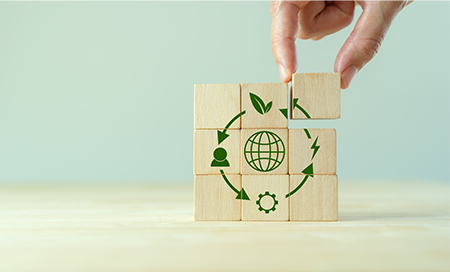Ensuring Sustainability: Questions to Ask Your Packaging Supplier

Consumer concerns around sustainability and protecting the environment have been increasing, leading to closer scrutiny of companies’ actions in those areas.
Nearly half (44%) of consumers said their interest in shopping sustainably has risen, according to the 2022 Consumer Sustainability Survey from Blue Yonder.
Much of the focus on sustainable business practices has revolved around packaging — 55% of consumers in a recent McKinsey survey reported that they were extremely or very concerned about the environmental impact of product packaging. Consumers were also concerned about packaging as it relates to food waste, citing an interest in attributes such as hygiene and safety, shelf life, and durability.
Questions for Your Packaging Supplier
Amid the growing consumer interest in eco-friendly business practices, food companies need to ensure that they are following through on their claims when it comes to sustainable packaging. Any misrepresentation of your sustainable business activities could be perceived as “greenwashing” and put your brand in a negative light.
In addition, the Federal Trade Commission oversees marketing claims around sustainability, and offers resources for companies on this topic in its Green Guides.
Sustainability is a complicated subject matter, however, especially when it comes to packaging. Materials that appear to be compostable, for example, might actually be compostable only in certain facilities, and the same goes for recyclables. It’s important to discuss these matters with your packaging supplier to ensure that, first, you are minimizing your environmental impact, and second, you are communicating honestly with your customers.
Following are some questions to ask your packaging supplier, and why they are important:
- Is the packaging compostable or recyclable, and if so, how does the end user dispose of it?
Whether or not any piece of packaging can be accepted for composting or recycling often has as much to do with the facility where it is being taken as it does with the materials from which it is made, said Viktoria Pakhnyuk, Ph.D., Sustainable Project Manager at Kwik Lok, the maker of packaging closure systems, labels, and machinery.
Materials that are certified as compostable are lab-tested to ensure that they do actually break down according to
specific parameters. However, composting facilities may not accept all types of organics.GreenBlue.org offers a guide to composting facilities in the U.S.
In addition, the term “biodegradable” is being phased out, Pakhnyuk said. “Anything is biodegradable if you give it enough time,” she said.
When it comes to recycling, she suggested that companies look to the Association of Plastic Recyclers for more information.
Plastics are not recycled equally – the type of polymer used, as well as the container shape and size, is important to consider
for its likelihood of being recycled.
Using packaging that is made from recycled materials is another option for companies seeking to make sustainability claims. That can be more complicated, however, Pakhnyuk said, citing the need for certification during several steps of the process by which the packaging is manufactured. The Recycled Materials Standard offers this guide to five global recycled materials standards.
In addition, some recycled materials may be FDA-approved food grade, while others are not.
- How can the true impact of a product be considered?
Food companies need to take a holistic look at the process by which their packaging is made, including the environmental impact
of each of the raw materials that go into the manufacture of the packaging.
Review of the entire packaging supply chain, beginning with whether or not the raw materials are sourced from renewable resources.
Organizations such as the Forest Stewardship Council provide certifications for the responsible sourcing of wood-based materials,
for example. The USDA also certifies bio-based products with the BioPreferred Program.
In addition, the packaging-manufacturing process itself needs to be considered in light of the water and energy needed to produce
the final product.
- Is this product compatible with my current operations? If not, what changes will I need to make?
Manufacturers need to ensure that the specifications of the packaging they choose meet the demands of their processes. Packaging that
slows the manufacturing process or generates excess waste might negate the beneficial impact that sustainable packaging would
otherwise provide.
Kwik Lok, for example, offers multiple packaging options for different manufacturers to ensure that their processes are optimized.
- Do you have the expertise that is required for today’s demands around sustainability?
Packaging suppliers should have a high level of knowledge when it comes to the nuances around sustainability issues and the environment. They should also be aware of regional regulatory variations around recycling and composting.
As a member of the Sustainable Packaging Coalition and the global Plastics Pact Network, Look for suppliers such as Kwik Lok that are
involved in the leadership of industry networks and that have strong credentials when it comes to using packaging materials responsibly.
“Being sustainable is very much a large team effort,” said Pakhnyuk. “It can’t just be a manufacturer. It can’t just be a producer. It has to be the entire stream. It’s very collaborative.”
For more information about how to ensure that your packaging meets your sustainability goals, and those of your customers, visit Kwik Lok today.